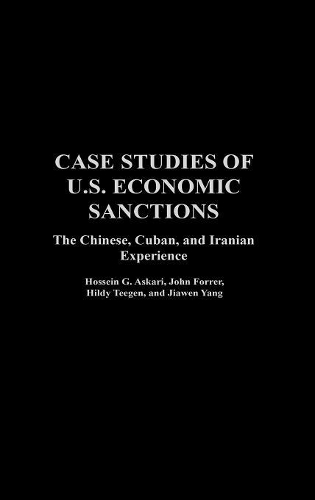
Case Studies of U.S. Economic Sanctions: The Chinese, Cuban, and Iranian Experience
(Hardback)
Publishing Details
Case Studies of U.S. Economic Sanctions: The Chinese, Cuban, and Iranian Experience
By (Author) Hossein G. Askari
By (author) John Forrer
By (author) Hildy Teegen
By (author) Jiawen Yang
Bloomsbury Publishing PLC
Praeger Publishers Inc
30th November 2003
United States
Classifications
Tertiary Education
Non Fiction
Political economy
327.117
Physical Properties
Hardback
304
Width 156mm, Height 235mm
539g
Description
This is the second of three related, empirically based studies examining the broad range of issues raised by the use of economic sanctions. This volume provides a detailed examination of the impact of U.S. economic sanctions on China, Cuba, and Iran as well as the impact on the United States itself. Ashari, Forrer, Teegen, and Yang analyze whether or not these case studies in economic sanctions had been successful by measuring their historical impact and modeling their effectiveness. This book will be of particular interest to scholars, students, researchers, and the public policy community involved with international business and economics and international relations.
Reviews
Does the world really need another book on economic sanctions In this case the answer is yes. The authors contribute usefully to a congested field by providing very thorough and thoughtful case studies of US economic sanctions against China, Cuba, and Iran....the authors look at precisely what sorts of economic sanctions were imposed and detail the different consequences on trade, investment, and technology transfer in the various affected sectors of these countries over time plus effects on third-party nations. The result is a multidimensional perspective that allows a fuller grasp of the direct and indirect costs and trade-offs inherent in economic statecraft in these examples of unilateral sanctions and the likelihood of detrimental unintended consequences. Highly recommended. Upper-division undergraduate and graduate students, scholars, and policy makers.-Choice
"Does the world really need another book on economic sanctions In this case the answer is yes. The authors contribute usefully to a congested field by providing very thorough and thoughtful case studies of US economic sanctions against China, Cuba, and Iran....the authors look at precisely what sorts of economic sanctions were imposed and detail the different consequences on trade, investment, and technology transfer in the various affected sectors of these countries over time plus effects on third-party nations. The result is a multidimensional perspective that allows a fuller grasp of the direct and indirect costs and trade-offs inherent in economic statecraft in these examples of unilateral sanctions and the likelihood of detrimental unintended consequences. Highly recommended. Upper-division undergraduate and graduate students, scholars, and policy makers."-Choice
Author Bio
HOSSEIN G. ASKARI is Aryamehr Professor of International Business at The George Washington University. He is the author or coauthor of 15 earlier books and monographs, including Economic Sanctions: Examining Their Philosophy and Efficacy (Praeger, 2003), coauthored with Forrer, Teegen, and Yang. JOHN FORRER is Director of the Institute for Global Management and Research at The George Washington University. He has consulted extensively on international energy and environmental issues. HILDY TEEGEN is Associate Professor of International Business at The George Washington University. She has written extensively on international negotiations and business partnerships and Latin American economic affairs. JIAWEN YANG is Assistant Professor of International Business, The George Washington University. He is the author of numerous articles and book chapters on exchange rate pass-through, international capital flows, and the financial crises in Latin America and Asia.
